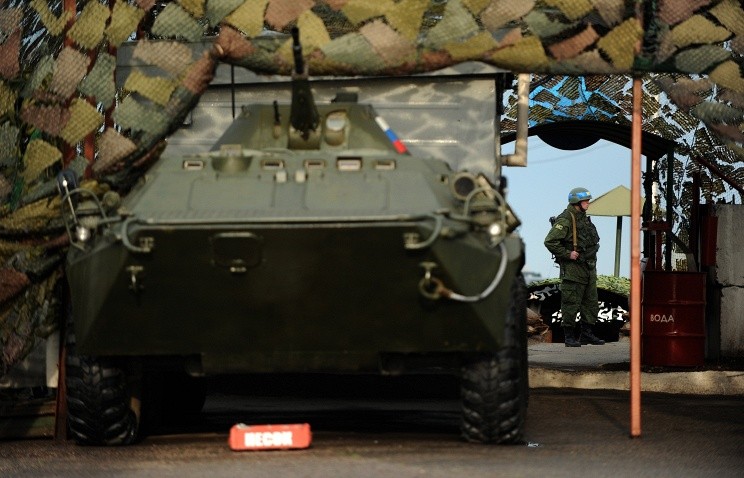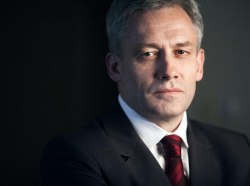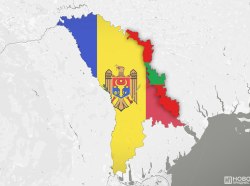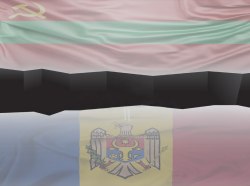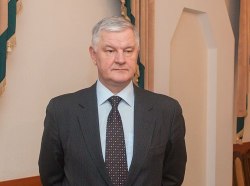— The situation around Pridnestrovie has recently aggravated. How do you assess the prospects, especially when taking into consideration the blockade measures imposed on Tiraspol by Kiev and Kishinev?
— One of fundamental conditions for negotiations on the Pridnestrovian settlement, which have been conducted for many years and in a variety of formats, is to avoid steps aggravating the partner's position. Otherwise, it is not negotiations, but pressure and blackmail.
Today Pridnestrovie has become the object of such uncovered pressure. The region actually exists under economic and humanitarian blockade.
The situation around Pridnestrovie became especially complicated after Moldova had signed the association agreement with the EU. With this step Kishinev totally ignored the choice of left bank residents in favour of close cooperation with the Customs Union. Moreover, mechanisms compensating for non-convergent economic interests of Pridnestrovie and Moldova are not even being worked at in Kishinev.
The situation is being even more aggravated by certain actions made by Ukraine. Referring to the fight against smuggling and the counteraction to new risks allegedly coming from Pridnestrovie, which is absolutely groundless, Ukraine has put a «secure lock» on the border. The European Union Border Assistant Mission (EUBAM) which was assigned to the Pridnestrovian-Ukrainian border by the European Union has not registered any fact of the kind throughout many years of its activity.
The situation is being aggravated by the campaign held by Ukraine's media. The campaign aims at creating «enemy image» for Pridnestrovie. It has been intensified after well-known «political practitioner» Mikhail Sakashvili was appointed Governor of Odessa. The provocative rhetoric on Pridnestrovie's allegedly posing threat to Ukraine is accompanied by Kiev's particular actions aimed at building up troops and military infrastructure at the border.
— How do the Ukrainian government's actions tell upon the Russian military in Pridnestrovie?
— The attempts to assign certain aggressive plans to Russia's military presence in Pridnestrovie are brazen provocation. Ukraine, which is represented in the Joint Peacekeeping Forces with a group of military observers, knows both the limited number of our contingent and the tasks it fulfils to maintain stability in the Security Zone and provide security of the ammunition depots in Kolbasna. There are no conditions for utilising or transporting this ammunition in the present circumstances.
Those who accuse Russia that Moldova has never agreed on the deployment of the Russian military in its territory suppress a very important circumstance — the issue could not be considered in this light because Russian troops have never moved in Moldova after it became independent. The 14th Army was quartered in the region in the Soviet period. The ammunition depots in Kolbasna is the property of the 14th Army which could not be taken out in the situation of armed conflict between the Dniester banks.
The Operational Group of Russian Forces (remaining detachments of the 14th Army) and Russian peacekeepers are in Pridnestrovie in compliance with Clauses 2 and 4 of the Agreement on principles of peaceful settlement of the armed conflict in the Dniester region of the Republic of Moldova, signed on 21 July 1992 by Russian and Moldovan presidents in the presence of Pridnestrovie's leader.
In order to provide life support for this contingent, a number of special agreements were signed with Ukraine. On 21 May these agreements were denounced by Ukraine's parliament, thus violating its international obligations. Of course, we will find a way out of the situation, though this approach does not contribute to stability in the region and complicates Russian participation in the peacekeeping operation.
In official statements Moldova's leaders (and not only they) urge «to transform the peacekeeping operation into a multi-national police mission», although the stabilising effect of the operation was highly appreciated in the joint statement signed by the presidents of Moldova, Pridnestrovie and Russia back in 2009. At the very beginning of the operation the peacekeepers managed to develop effective monitoring of the Security Zone and prevent the escalation of incidents. Operation efficiency is proved by the fact that no peacemaker has been killed in action.
The withdrawal of the peacekeeping operation in the Security Zone may lead again to a direct military showdown. If this is what «transformation» advocates strive for, I hope, they understand they will be totally accountable for a new flashpoint of tension.
— What assistance does the Russian Federation provide to Pridnestrovie?
— Our interaction with Tiraspol is based on inter-agency memorandums signed between a number of Russian ministries and their Pridnestrovian counterparts. There is a non-profit organization «Eurasian Integration» in the region which is implementing a number of social projects (construction of kindergartens, maternity hospitals, etc.)
— What are the prospects for resuming negotiations in the 5+2 format?
— Stagnation of negotiations in the 5+1 format causes big concern. Only two conferences instead of the five or six, which the parties had agreed on, were held in 2014, and they did not manage to hold a single official meeting from January through to June 2015. The prime cause of the situation is the continuing deterioration of dialogue between Moldova’s government and Pridnestrovian authorities. But international mediators should have a say in rectifying the situation. We’re working actively both with the conflict sides and with the mediators.
We think the pause (in the talks) should get dragged out, as the resumption of the process in 2011 after a break of six years was too costly for everyone. We expect that after a new government is formed Moldova's leadership will finally take up a realistic position on the Pridnestrovian settlement and as a first step will repeal some badly conceived decisions — criminal charges brought against Pridnestrovian authorities, blockade measures and so on. This will help to return the sides to the negotiating table. It is a welcome fact that pliant and pragmatic politician Victor Osipov, well known to us, is handling these difficult problems.
We are still proceeding from the fact that the conditions for discussing political issues in the 5+2 format are yet to mature. The sides should build confidence to each other with real steps, show willingness to settle an issue, and not only discuss it.
Last but not least. Any provocation against Tiraspol, wherever it may come from, will not only complicate negotiations, but will lead to a dead end. We cannot admit such scenario in Pridnestrovie.

